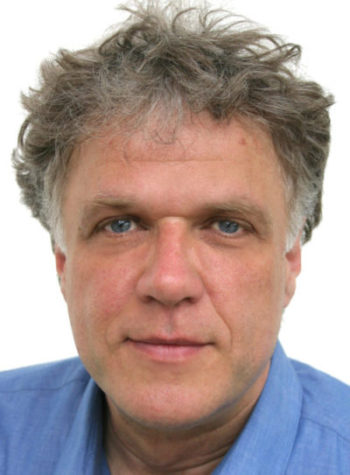
Biography
Composer Stefan HAKENBERG was born in 1960 in Wuppertal, Germany. His work includes a wide variety of musical media. The integration of players of non-western classical background has particularly shaped HAKENBERG’s creative thought. Reviewers have praised his music as “highly original,” “dramatic and memorable,” “creating strong musical expressions in a densely contrapuntal style.” Full of innovations his work is an ongoing reflection on the musical styles of today that he culls along an international career that has taken him from Cologne’s experimental 80s New Music scene to Boston’s 90s multicultural academic world, to the particularly Asian combination of influences in Seoul, Korea at the turn of the millennium. HAKENBERG has served as the director of the Public Music School Division of the Darmstadt Academy for Musical Arts. He is also a founder of the Alaskan contemporary music organization “CrossSound,” which won a 2002 ASCAP-Chamber Music America Award for Adventurous Programming of Contemporary Music, and in 2005 received an NEA Creativity Grant for a program including HAKENBERG’s pansori “Klanott and the Land Otter People” on an Alaska Native story. HAKENBERG now resides in Graz, Austria.
Amongst the presenters of his music are the “Cube” ensemble from Chicago, the “Hong Kong Chinese Orchestra Chamber Ensemble,” the “El Cimarron Ensemble” and “lagrimosa beltà” from Salzburg, “IIIZ+,” “Sagye” from Seoul, “ALEA III,” “Dinosaur Annex,” “BMOP,” and “Arcadian Winds” from Boston, “re-sound” from Melbourne, “Ensemble Phorminx” from Darmstadt, “The New Millennium Ensemble” from New York, the “Bangkok Saxophone Quartet,” “Duo Contemporain” from Rotterdam, “UnitedBerlin,” “AsianArt Ensemble,” and “sonic.art Saxophone Quartet” from Berlin; the jazz band “Common Ground” (Matthias Akeo Nowak, Sebastian Gille, Achim Kaufmann, Bill Elgart), the “BundesJazzOrchester,” the “Gürzenich Orchester der Stadt Köln,” the “Heidelberger Sinfoniker,” “Jugendzupforchester of NRW,” and the “Landesjugendorchester NRW;” conductors like Stewart EMERSON, Clemens HEIL, Vladimir JUROWSKI, Thomas KALB, Jeffrey MILARSKY, Roger NELSON, Richard PITTMAN, Morris ROSENZWEIG, Carl ROSMAN, Peter SELWYN, Johannes STERT, Markus STENZ, George TSONTAKIS, Timothy WEISS, Stephan WINCKLER, and Thomas WISE; and soloists like Frauke AULBERT, Matthias BAUER, Claudia BUDER, Phoebe CARRAI, Il-Ryun CHUNG, DAI Xiaolian, Makiko GOTO, Nicholas ISHERWOOD, JI Aeri, KIM Woongsik, Rainer Maria KLAAS, Marco LIENHARD, Dan LIPPEL, Dimitris MARINOS, MEI Han, Julia MIHÁLY, Marlene MILD, Heather O’DONNELL, Frances PAPPAS, SAITOH Tetsu, Robert SCHULZ, Jeremias SCHWARZER, Janet UNDERHILL, Olaf VAN GONNISSEN, WANG Changyuan, Laura YOUNG, and Martin ZEHN amongst many others. HAKENBERG’S work has been featured in portrait concerts by the Folkwang Music School in Essen, Germany, by Greenwich House Arts in New York City, by the Academy for Musical Arts in Darmstadt, Germany, and in a weekend focussing on his music presented by Landesmusikrat NRW and European Capital of Culture Ruhr.2010 in Witten, Germany.
Films by Theo LIPFERT with scores by Stefan HAKENBERG, “Solving for X,” “The Displacement Map,” and “Taubman Sucks,” won awards at festivals in Portland (Oregon), Kansas City, and Honolulu, and three screenings at the Tribeca Film Festival among many more places. Films with his music can be seen on US television channels regularly and “From the Mekong to Montana” was screened at the Park City Film Music Festival 2012. In 2007 HAKENBERG was credited with having written the first “climate opera” with his chamber work “The Egg Musher,” libretto by Michael KERSTAN, on the topic of global warming. His dance opera “Schau nicht zurück, Orfeo!” (libretto: Patricia Anne SIMPSON) was premiered to great acclaim in 2010 at the International Gluck Opera Festival in Nuremberg, Germany. His last opera “The Amputation of Charlie Sharp” (libretto: Philip GOUREVITCH) was premiered in 2014 at the festival “NOW!” in Essen, Germany.
HAKENBERG attended the conservatories of Düsseldorf and Cologne where he studied composition with Hans Werner HENZE. He received a Ph.D. from Harvard University where he studied with Bernard RANDS and Mario DAVIDOVSKY. Other grants and fellowships brought him to the summer festivals in Tanglewood (where he studied with Oliver KNUSSEN on a Leonard Bernstein Fellowship), Aspen (where he studied with John HARBISON), and Fontainebleau (where he studied with Betsy JOLAS), to the artist colonies “The MacDowell Colony” in New Hampshire, “Yaddo” in Saratoga Springs, and the “Atelierhaus Worpswede” in Lower Saxony. MeetTheComposer, the Alaska State Council on the Arts, various Alaskan arts and humanities councils, the State Music Council of North-Rhine Westphalia, and the Endowments for the Arts in North-Rhine Westphalia and Lower Saxony have directly sponsored his work repeatedly.
HAKENBERG has followed invitations to present about his own music and give masterclasses at universities around the world such as the Mimar Sinan Fine Arts University Conservatory in Istanbul, Turkey, MIT in Cambridge, Massachusetts, the University of Music and Performing Arts Munich, Germany, or Melbourne Conservatory of Music and Monash University in Melbourne, Victoria.
HAKENBERG’s music is published by AUGEMUS Musikverlag, Bochum, Germany and Osaka Mozart Association, Japan. Recordings are available on Bridging Arts Records, Salzburg, Austria, Capstone Records, Brooklyn, New York, Horncastle Verlag, Munich, Germany, and VDM Records, Rome, Italy.
Works for Japanese musical instruments
- Montaged Soundings 2020
mezzo-soprano and small orchestra (including 2 shakuhachi) (2020) - Song of a Japanese White-Eye
shakuhachi (2018) - Song of a Giant Tortoise
shakuhachi (2012) - Dirge and Computation
shakuhachi and koto (2011) - Zerrende Geister (III)
violin, viola, cello, contrabass, daegeum, kayageum, and bass koto (2011) - Schau nicht zurück, Orfeo!
soloists, chorus, dancers, and chamber orchestra (including koto and bass koto) (2010) - Moments in Human Life
koto, kayageum, Korean percussion, guzheng, and string quartet (2008) - Orfeo On My Mind
shakuhachi and koto (2009) - Antares
shakuhachi and koto (2007) - Jet-Black and Silver
shakuhachi and koto (2006) - It Lightens, It Brightens …
bass recorder, kayageum, bass koto, and cello (2003) - The Displacement Map
2 violins, cello, flute, oboe, horn, trumpet, euphonium, koto, and guitar (2002) - Three Zithers and a Pair of Scissors
koto, kayageum and changgu, and guzheng (1998) - Strands
koto and trombone (1997)
